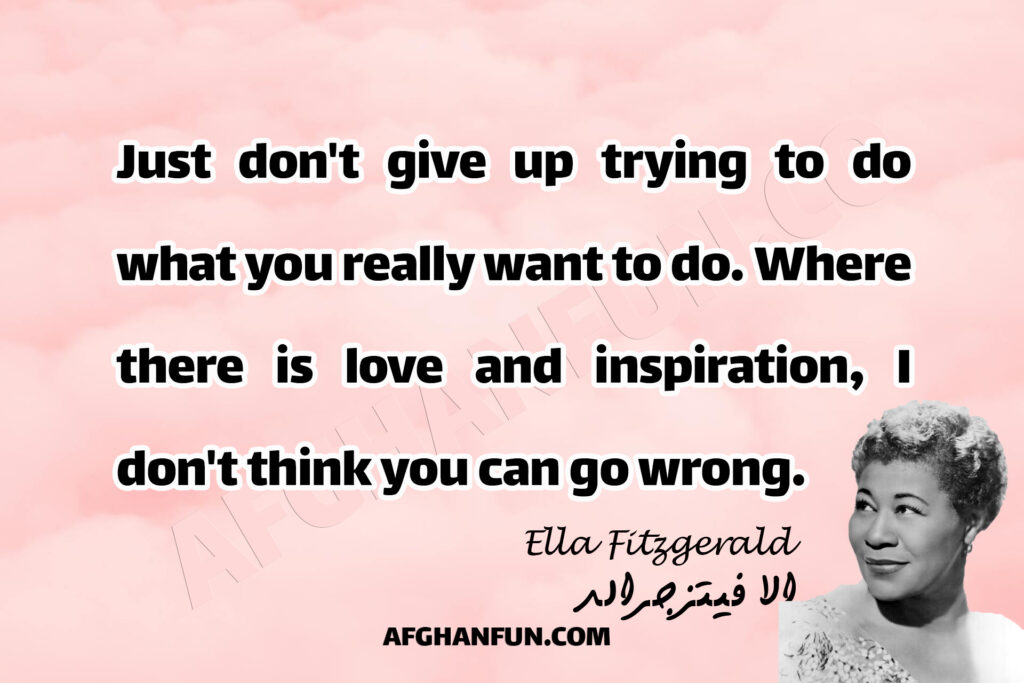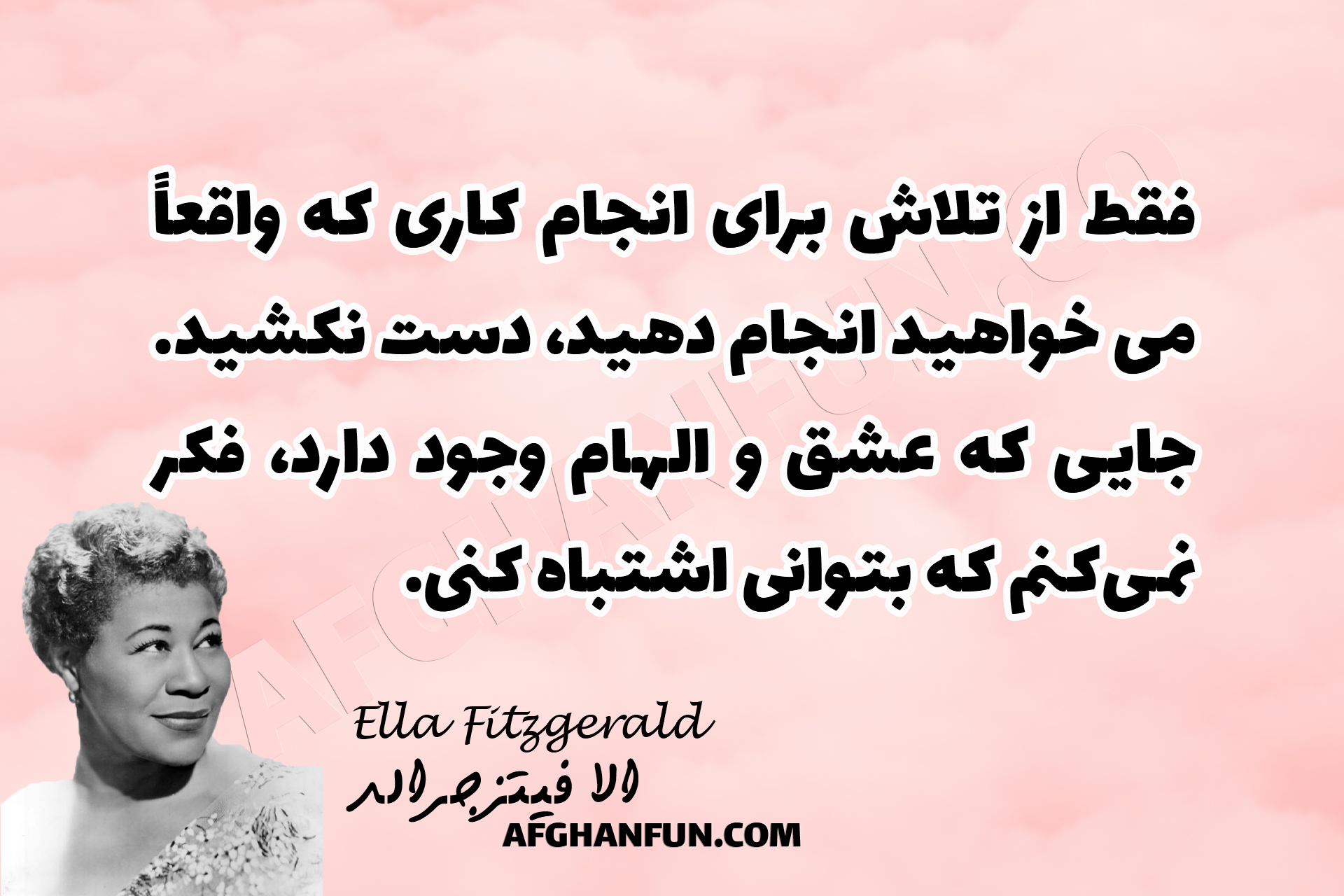
Just don’t give up trying to do what you really want to do. Where there is love and inspiration, I don’t think you can go wrong.
Ella Fitzgerald
Фақат аз кӯшиш барои анҷом додани коре, ки воқеан мехоҳед анҷом диҳед, даст накашед. Ҷоие, ки муҳаббат ва илҳом вуҷуд дорад, ман намебинам, ки метавонед иштибоҳ кунед.
Элла Фитцҷералд
فقط از تلاش برای انجام کاری که واقعاً می خواهید انجام دهید، دست نکشید. جایی که عشق و الهام وجود دارد، فکر نمیکنم که بتوانی اشتباه کنی.
الا فیتزجرالد
فقط لا تتوقف عن محاولة القيام بما ترغب حقًا في القيام به. حيثما يوجد الحب والإلهام، لا أعتقد أنه يمكنك أن تخطئ.
إلا فيتزجيرالد
This quote of Ella Fitzgerald, speaks to the importance of persistence, passion, and authenticity in the pursuit of one’s dreams. Let’s break it down:
1. “Just don’t give up trying to do what you really want to do.”
Message: This part of the quote emphasizes the idea of perseverance and commitment. The phrase “don’t give up” underscores the importance of resilience when facing challenges or setbacks in pursuing your goals. “What you really want to do” highlights the value of pursuing one’s true passion, desires, and aspirations.
Interpretation: The quote suggests that success is not necessarily about the outcome but about the persistence and effort in following your genuine ambitions. It encourages people to stay true to themselves and continue striving for what they truly care about, even in the face of difficulties.
2. “Where there is love and inspiration, I don’t think you can go wrong.”
Message: This part suggests that when you are driven by love (whether it be love for the craft, the process, or the people you’re serving) and inspiration (the motivating force that comes from creativity or a deep inner desire to make a difference), you are on a path that is aligned with authenticity and purpose.
Interpretation: Love and inspiration are presented as guiding forces that can steer you in the right direction. The statement “I don’t think you can go wrong” implies that if your actions are rooted in these positive, pure emotions, even if the journey is difficult or uncertain, you are likely to be on the right path.
Key Themes:
Persistence: The first part stresses the need for continuous effort. Success is not guaranteed through instant results but through consistent work toward a goal that is meaningful to you.
Authenticity and Passion: The focus on doing what “you really want to do” ties into the idea of pursuing personal authenticity. When you’re passionate about what you’re doing, your energy is more aligned with your goals, and you’re more likely to find satisfaction and fulfillment along the way.
Love and Inspiration as Guiding Forces: The reference to love and inspiration elevates the pursuit beyond mere work or external rewards. It ties the process to deeper values, suggesting that when you are emotionally connected and driven by something greater than just achievement, you will be led in the right direction.
Psychological Insight:
From a psychological perspective, the quote connects to several well-known theories:
Self-Determination Theory: This theory posits that people are most motivated and fulfilled when they engage in activities that align with their intrinsic interests and values. By following one’s true passion, you increase intrinsic motivation, which is a powerful driver of long-term success and happiness.
Growth Mindset (Carol Dweck): A growth mindset, which emphasizes effort and persistence over innate ability, aligns with the notion of “not giving up.” It suggests that success comes through continuous learning and trying, regardless of initial failures.
Conclusion:
The quote is a message of encouragement that reinforces the idea of doing what you love and not giving up, even when the path gets tough. It positions love and inspiration as essential motivators that can guide and sustain you in your endeavors, making the journey meaningful, regardless of external validation or the certainty of success. It encourages faith in the process, suggesting that if you are true to your passion and driven by positive forces, you will ultimately find fulfillment and direction.
Ella Fitzgerald: The First Lady of Song
Full Name: Ella Jane Fitzgerald
Born: April 25, 1917, Newport News, Virginia, USA
Died: June 15, 1996, Beverly Hills, California, USA
Genre: Jazz, Swing, Pop, Blues
Occupation: Singer, Songwriter
Years Active: 1934–1996
Overview:
Ella Fitzgerald, often referred to as the “First Lady of Song” or the “Queen of Jazz,” is widely considered one of the greatest vocalists of the 20th century. Renowned for her incredible vocal range, impeccable pitch, and expressive delivery, Fitzgerald’s contributions to music transcended genres, and her mastery of jazz improvisation set her apart from her contemporaries. Over her career, she performed with some of the most prominent jazz musicians and recorded hundreds of songs that have become iconic.
Early Life:
Ella Fitzgerald was born in Newport News, Virginia, and raised in Yonkers, New York. Her early life was marked by hardships, including the loss of her mother and living in foster homes. She showed an early interest in music and was inspired by the records of Billie Holiday, the Boswell Sisters, and Louis Armstrong, among others. Fitzgerald’s breakthrough moment came in 1934 when, at age 17, she won an amateur singing contest at the Apollo Theater in Harlem, a moment that launched her professional career.
Career Highlights:
- The Chick Webb Orchestra (1935–1939): Fitzgerald’s early professional career was with the famous swing band led by drummer Chick Webb. Her first major hit with Webb’s band was “A-Tisket, A-Tasket” (1938), which became a smash hit and made her a household name. This song demonstrated Fitzgerald’s mastery of scat singing and her ability to fuse complex jazz phrasing with an accessible, melodic style.
- Solo Career (1940s–1990s): After Webb’s death in 1939, Fitzgerald embarked on a solo career that spanned more than six decades. She recorded with some of the most legendary names in jazz, including Duke Ellington, Count Basie, and Louis Armstrong. Her work with Armstrong on albums such as Ella and Louis (1956) remains one of the most beloved collaborations in jazz history.
- Songbook Series (1950s–1960s): One of the defining features of Fitzgerald’s career was her series of “Songbook” albums, where she interpreted the works of American songwriters such as Cole Porter, Irving Berlin, George Gershwin, and Rodgers and Hart. These albums showcased her vocal dexterity and her ability to bring new life to some of the greatest standards in American music. The Ella Fitzgerald Sings the Cole Porter Songbook and Ella Fitzgerald Sings the George Gershwin Songbook are among the most celebrated of these recordings.
- Live Performances: Fitzgerald was known for her live performances, where she would often improvise and engage with the audience. Her concert at the Montreux Jazz Festival in 1969 is considered one of the highlights of her career, displaying her incredible vocal technique and stage presence.
Style and Influence:
Ella Fitzgerald’s vocal style was marked by her extraordinary technical skill and her ability to effortlessly navigate complex melodies and harmonies. She possessed a vocal range that spanned three octaves, and she could sing in a wide array of styles, from straight-ahead jazz to scat singing, blues, and ballads.
Fitzgerald’s scat singing (improvised vocalization of syllables or nonsensical words) became one of her signature features. This vocal improvisation was influenced by jazz instrumentalists, and she was able to incorporate it into her singing with remarkable ease. Her delivery was known for being both precise and emotional, as she could convey deep feeling with little overt embellishment.
Legacy:
Ella Fitzgerald’s legacy extends far beyond her vast catalog of recordings. She is widely regarded as one of the greatest jazz singers of all time, and her influence continues to shape vocalists across genres. Fitzgerald won 13 Grammy Awards and was the recipient of numerous honorary awards, including the National Medal of Arts and the Presidential Medal of Freedom.
Her contributions to jazz, as well as her interpretations of popular American songwriters, have left a lasting imprint on the music world. Ella Fitzgerald’s voice is often cited as one of the purest and most technically skilled in music history, and her ability to convey the emotion of a song remains unparalleled.
Personal Life:
Fitzgerald had a tumultuous personal life, including struggles with both her health and finances. She was married twice, first to bassist Ray Brown (from 1947 to 1952) and later to hotelier and businessman, George E. Treadwell. Despite facing challenges, including battles with substance abuse, Fitzgerald continued to perform and record well into her later years.
In her later years, Fitzgerald’s health began to decline, and she was diagnosed with diabetes, which led to complications, including the loss of her eyesight. She passed away in 1996 at the age of 79, leaving behind a legacy that continues to inspire musicians and fans alike.
Notable Albums:
- Ella Fitzgerald Sings the Cole Porter Songbook (1956)
- Ella and Louis (1956) with Louis Armstrong
- Ella Fitzgerald Sings the George Gershwin Songbook (1959)
- The Best of the Songbooks (1997, posthumous compilation)
- Ella Fitzgerald: The Legendary Decca Recordings (2007)
Conclusion:
Ella Fitzgerald’s extraordinary voice and unmatched technical ability made her a cornerstone of jazz music. Whether interpreting the Great American Songbook, collaborating with jazz giants, or performing for captivated audiences worldwide, Fitzgerald’s impact on music remains immeasurable. Her artistry elevated the art of singing, and her recordings continue to serve as a benchmark for vocal excellence.











